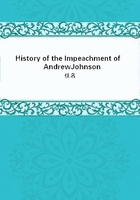
第21章 MR. JOHNSON'S ACCESSION TO THE PRESIDENCY.(8)
The ostensible basis of the disagreement which in a few months after the accession of Mr. Johnson to the Presidency began to develop between himself and the Republican leaders in Congress, was the plan of reconstruction put in operation by him during the recess of Congress that year, 1865, and outlined in his North Carolina Proclamation. It availed not, that that plan had been adopted originally by Mr. Lincoln a few days before his death--that it had been concurred in by his entire Cabinet and would undoubtedly have been carried out successfully by him had he lived that plan was made the ground of criticism of Mr.
Johnson by the extreme party element in control of Congress, which persistently accused him of having abandoned the plan initiated by Mr. Lincoln, and of setting up another of his own, for purely personal and ambitious purposes, and to the detriment of the peace of the country.
Mr. Johnson may have been opinionated and headstrong, a characteristic of a great many people of strong convictions of duty and purpose; while the overwhelming numerical strength of the dominant party in and out of Congress made it seemingly indifferent, reckless and inconsiderate of the convictions, as of the rights and prerogatives of the Chief Executive treating him more as a clerk whose sole duty it was to register without suggestion the decrees of Congress.
That Mr. Lincoln, had he lived, would have pursued much the same policy of reconstruction, is clearly indicated by the established fact that he had determined to adopt precisely the initial measures thereto which Mr. Johnson did inaugurate and attempt to carry out. But Mr. Lincoln's superior ability in statecraft, his rare tact and knowledge of men, and his capacity for moulding and directing public opinion, seeming to follow where he actually led, would doubtless have secured a more favorable result. And more than all else, it can scarcely be doubted, that the unbounded confidence of the people in his patriotism and capacity to direct public affairs, would have enabled him to dictate terms of reconstruction strictly on the lines he had marked out, and would have commanded the general support of the country, regardless of partisan divisions, notwithstanding the well known fact that at the time of his death there were unmistakable indications of alienation from him of the extreme element of his party because of his conservative views as to the proper methods of reconstruction.
Meantime, in the effort to hamper the President, as far as it was possible for Congress to do, the Tenure-of-Office Act was passed, early in 1867. The ostensible purpose of that Act was to restrict the authority of the President in the selection of his Cabinet advisers, and his power over appointments generally. Its specific purpose, at least so far as the House of Representatives was concerned, and measurably so in the Senate, was to prevent his removal of the Secretary of War, Mr. Stanton, with the manifest if not avowed intent, as the sequel shows, to make that Secretary not only independent of his chief, but also to make him the immediate instrument of Congress in whatever disposition of the Army, or of military affairs generally relating to the government of the Southern States, the majority of Congress might dictate.
In a word, the Congress, in that Act, virtually assumed, or attempted to assume, that control of the Army which the Constitution vests on the President.
The first effort to impeach the President, in 1867, was based upon a general accusation of high crimes and misdemeanors without literal specification. The second, in 1868, was based upon his alleged violation of the Tenure-of-Office Act, in the removal of Mr. Stanton.
While it is undoubted, as already shown, that Mr. Lincoln and Mr.
Johnson were in accord as to the methods to be adopted for the restoration of the revolted States, it was Mr. Johnson's misfortune that he had not Mr. Lincoln's capacity for so great and so peculiar a task; though a gentleman of proven patriotism, ability, of a kindly, genial nature, and with record of valuable public service. Hampered by his lack of political finesse and intricate knowledge of state-craft, and in view of the conditions of that time, and the people with whom he had to deal, it was obvious from the outset that the result of the controversy could hardly be otherwise than disastrous to him. Mr. Lincoln would undoubtedly have been met by the same character of opposition, and from the same source. But there would have been the appearance at least of mutual concession, and while the APPEARANCE of concession would have been on Mr. Lincoln's side, the actual concession, so far as essentials were involved, would have been on the other.